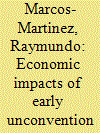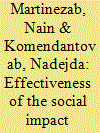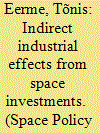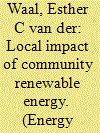|
|
|
Sort Order |
|
|
|
Items / Page
|
|
|
|
|
|
|
| Srl | Item |
| 1 |
ID:
186450


|
|
|
|
|
| Summary/Abstract |
The 2010 energy subsidy reform in Iran is a unique case of redistributive policy as the savings from the subsidy cut have been redirected to households as unconditional, universal cash transfer. While theoretically, the cash transfer was large enough to keep the utility of the average household at the initial level, this study explores the practical impacts of the reform. We analyze panel data on income/expenditure of Iranian households for the period 2010–2012. Since this is a universal reform, we exploit the time dimension and the intensity of energy consumption in the identification and assess the robustness of the results with sub-sample and placebo analyses. Overall, the energy subsidy reform caused a significant shrinkage (7%–9%) in households' real consumption. The cash transfer failed to fully compensate the negative impact of the subsidy removal. The impact is heterogeneous, varying along the intensity of energy consumption, geographical location, income and the share of the cash transfer in a household's income. A non-negligible policy accomplishment of the reform is that within its first two years poverty was mitigated in absolute and relative terms and income inequality slightly improved. Nevertheless, the government is under pressure because inflation counteracts these gains.
|
|
|
|
|
|
|
|
|
|
|
|
|
|
|
|
| 2 |
ID:
162970


|
|
|
|
|
| Summary/Abstract |
Globally, the development of the unconventional natural gas (UNG) industry is expected to continue as gas consumption increases in the transition to cleaner energy sources. However, social and regulatory factors may constrain UNG activity at regional scales. Robust impact assessments of the effects of the UNG industry at different phases of development could help reduce trade-offs of energy policy and promote overall welfare improvements. We assessed if the early phases of the coal seam gas (CSG, a type of UNG) industry in New South Wales, Australia produced regional economic changes between 2001 and 2011. We combined spatial econometrics, genetic matching algorithms and seemingly unrelated regressions with instrumental variables to control for multiple factors influencing regional economic patterns (e.g., climate, human capital) to estimate the effect of the CSG industry on local income and employment. Results show that regions with CSG activity had 7% (±5%, 95% C.I.) higher family income than regions without CSG mining. No statistical evidence of indirect employment multiplier effects from CSG activity were found. The analysis can inform social license and regulatory decisions related to the CSG industry that impact competing social priorities such as energy and water security, economic growth and environmental health.
|
|
|
|
|
|
|
|
|
|
|
|
|
|
|
|
| 3 |
ID:
174982


|
|
|
|
|
| Summary/Abstract |
Social opposition to renewable energy (RE) projects has become a significant issue both for the deployment of RE technologies and the social justice of this process. However, the policy tools oriented to address this issue have received little research attention, particularly in the Global South. Thus, this research analyses the effectiveness of the social impact assessment (SIA) in Mexico's RE sector. In 2014 the government of Mexico introduced the SIA in response to the social conflicts around RE projects. The SIA has generated some favorable changes in the sector's social management. Yet, its effectiveness is constrained by diverse issues related to its institutional and regulatory design, government implementation, practices of companies and consultants, and restricted social involvement. Moreover, the sector's socio-technical arrangement (priorities, organization, experience, and policies) strongly influences the performance of SIAs and accounts for the lack of consideration of social aspects in project design and planning. We argue that without a substantial internalization of the social dimension in the priorities, policy, and planning of RE, the SIA would be limited to a problem-fixing role, which would constrain the effective management of social impacts.
|
|
|
|
|
|
|
|
|
|
|
|
|
|
|
|
| 4 |
ID:
127215


|
|
|
|
|
| Publication |
2014.
|
| Summary/Abstract |
The goal of optimising the energy yield of renewables sits uneasily with the politics and processes of planning for wind turbines. In countries such as the UK the land-use planning consent regime is not concerned with the energy yield of proposed wind developments. This is a matter for the developer rather than the regulator, which might seem curious given the policy commitment to maximising the potential for renewable energy generation and the need to weigh up local environmental impacts with emissions reduction. In this paper, we highlight and investigate the implications of the exclusion of energy yield from wind turbine regulation. The case is made for increasing the weight given to energy yield within Environmental Impact Assessment and the land-use planning process.
|
|
|
|
|
|
|
|
|
|
|
|
|
|
|
|
| 5 |
ID:
140716


|
|
|
|
|
| Summary/Abstract |
Facilitadores Judiciales is a programme run by the Organization of the American States and the Nicaraguan judiciary. In 2010, facilitators were recruited and trained in many but not all urban municipalities. This presented an opportunity for a natural experiment to assess the impact of the programme. In our theoretical framework the impact is related to improved access to justice which is one of the prerequisites for peace and development. Before and after quantitative and qualitative studies were conducted in intervention and control areas. The quantitative results show confirmation of some of the hypothesized effects of the programme. Other effects are indicated by the numerous in-depth interviews but are not substantiated by hard data. In the communities where facilitators were introduced the people report fewer legal problems. The facilitators are decreasing the costs of justice. Achieving amicable solutions and promotion of peace and social cohesion is another example of the programme's impact.
|
|
|
|
|
|
|
|
|
|
|
|
|
|
|
|
| 6 |
ID:
157161


|
|
|
|
|
| Summary/Abstract |
Many impact assessments have been carried out to evaluate the economic and social effects of public investments in space. This paper focuses on ex post analyses of indirect industrial (intra-firm) effects, a sub-type of the impact assessments. A number of existing country-wide analyses report the ratio of the indirect industrial effects deriving from space-related contracts to the value of the space-related contracts placed with companies by governmental agencies (in Europe, mostly by the European Space Agency). This ratio is a widely accepted measure of the economic impact of the space contracts. The aim of this paper is to assess the usefulness of the ratio, a spin-off multiplier, for international benchmarking of the efficiency of space investments. The paper is the first attempt to provide an in-depth analysis of the methodological foundations of different country-wide studies on the spin-off multiplier performed in Europe. The country-wide studies have formulated different metrics and relied on different approaches to gathering quantitative data. The current paper discusses data quality issues that may result in a biased estimate of the spin-off multiplier. Data gathering techniques used in the studies tend to result in overestimated economic benefits. Even though the values of the spin-off multipliers are high in countries like Norway or Denmark, the confidence interval of the estimates is wide. The paper discusses time considerations to be taken into account for a standardized ratio as there is a time lag of several years until research and development becomes operative. Despite several methodological limitations, measuring the indirect industrial effects is a valuable tool for governments, especially for smaller ESA member states, as such studies can be implemented at low cost and provide information on spillovers from space programmes.
|
|
|
|
|
|
|
|
|
|
|
|
|
|
|
|
| 7 |
ID:
171506


|
|
|
|
|
| Summary/Abstract |
Local benefits of community renewable energy (CRE) –ranging from an increase in social cohesion, jobs, services, knowledge and skills - are widely assumed in academia and among policy makers. However, there are both a lack of evidence on these impacts and a lack of formal impact assessment methodologies to assess them. This research explores change mapping, an impact assessment methodology, to contribute to evaluative frameworks for assessment of the effects of CRE projects on their host communities. With this methodology, the local impacts of a 900 kW community wind project on the Scottish island Shapinsay are assessed, using an exploratory survey, interviews, and two focus group sessions. When it comes to the local impacts, the biggest changes residents experience are either direct or indirect effects of the RE revenues. Modest but ostensible effects are visible on local economic development, social cohesion, and knowledge and skill development. From the case study can be concluded that community-ownership of energy technologies can indeed be empowering, but also creates vulnerability. Stable energy policies and support during the operational phase are needed to keep up the stream of RE income that functions as a source of independent income.
|
|
|
|
|
|
|
|
|
|
|
|
|
|
|
|
| 8 |
ID:
152788


|
|
|
|
|
| Summary/Abstract |
This article examines the implications of undertaking community-based impact assessment (CBIA) in the Swedish context where Indigenous rights receive little recognition and the institutional planning environment is disenabling. It explores how normative biases built into the permitting process for mines ontologically privilege non-Indigenous ways of defining what constitutes relevant impacts. We show how the CBIA, undertaken by an impacted Sami community together with the authors, attempted to challenge these biases by constructing narratives about future impacts from the perspective of the Indigenous community. We also discuss how the research itself became embroiled in contestations over what constituted legitimate knowledge.
|
|
|
|
|
|
|
|
|
|
|
|
|
|
|
|
| 9 |
ID:
195325


|
|
|
|
|
| Summary/Abstract |
Canada is planning to construct a set of new and hitherto untested nuclear reactor designs called Small Modular Reactors. The government has incentivised this process by providing tens of millions of dollars to companies developing these designs. In this paper, we describe two problems with the process of regulating these technologies. The first problem is evidence of institutional bias within the federal regulatory body that is tasked with regulating these technologies. Using the case of small modular reactors, this paper details how the regulator's actions do not suggest unbiased decision making. The second problem is the exclusion of small modular nuclear reactors from the Impact Assessment process. As a result, the discussion about whether to construct these reactors will be based on an incomplete understanding of the full environmental consequences of the decision to build. Finally, we offer policy recommendations to address these problems.
|
|
|
|
|
|
|
|
|
|
|
|
|
|
|
|
| 10 |
ID:
152789


|
|
|
|
|
| Summary/Abstract |
Large-scale mineral extraction is often accompanied by local conflicts, reflecting the fact that affected communities feel the costs of development but enjoy few of its benefits. Much of this conflict could be mitigated if communities could influence the design of projects and of management systems intended to minimise their impacts. This paper examines the potential role of community-controlled impact assessment, combined with negotiation of binding agreements between communities and developers, to allow affected communities to shape the impacts of extractive projects. It considers the wider political factors that must be addressed if these mechanisms are to be effective.
|
|
|
|
|
|
|
|
|
|
|
|
|
|
|
|
| 11 |
ID:
119781


|
|
|
|
|
| Publication |
2013.
|
| Summary/Abstract |
In the transition to sustainable economic structures the European Union assumes a leading role with its climate and energy package which sets ambitious greenhouse gas emission reduction targets by 2020. Among EU Member States, Poland with its heavy energy system reliance on coal is particularly worried on the pending trade-offs between emission regulation and economic growth. In our computable general equilibrium analysis of the EU climate and energy package we show that economic adjustment cost for Poland hinge crucially on restrictions to where-flexibility of emission abatement, revenue recycling, and technological options in the power system. We conclude that more comprehensive flexibility provisions at the EU level and a diligent policy implementation at the national level could achieve the transition towards a low carbon economy at little cost thereby broadening societal support.
|
|
|
|
|
|
|
|
|
|
|
|
|
|
|
|
|
|
|
|
|